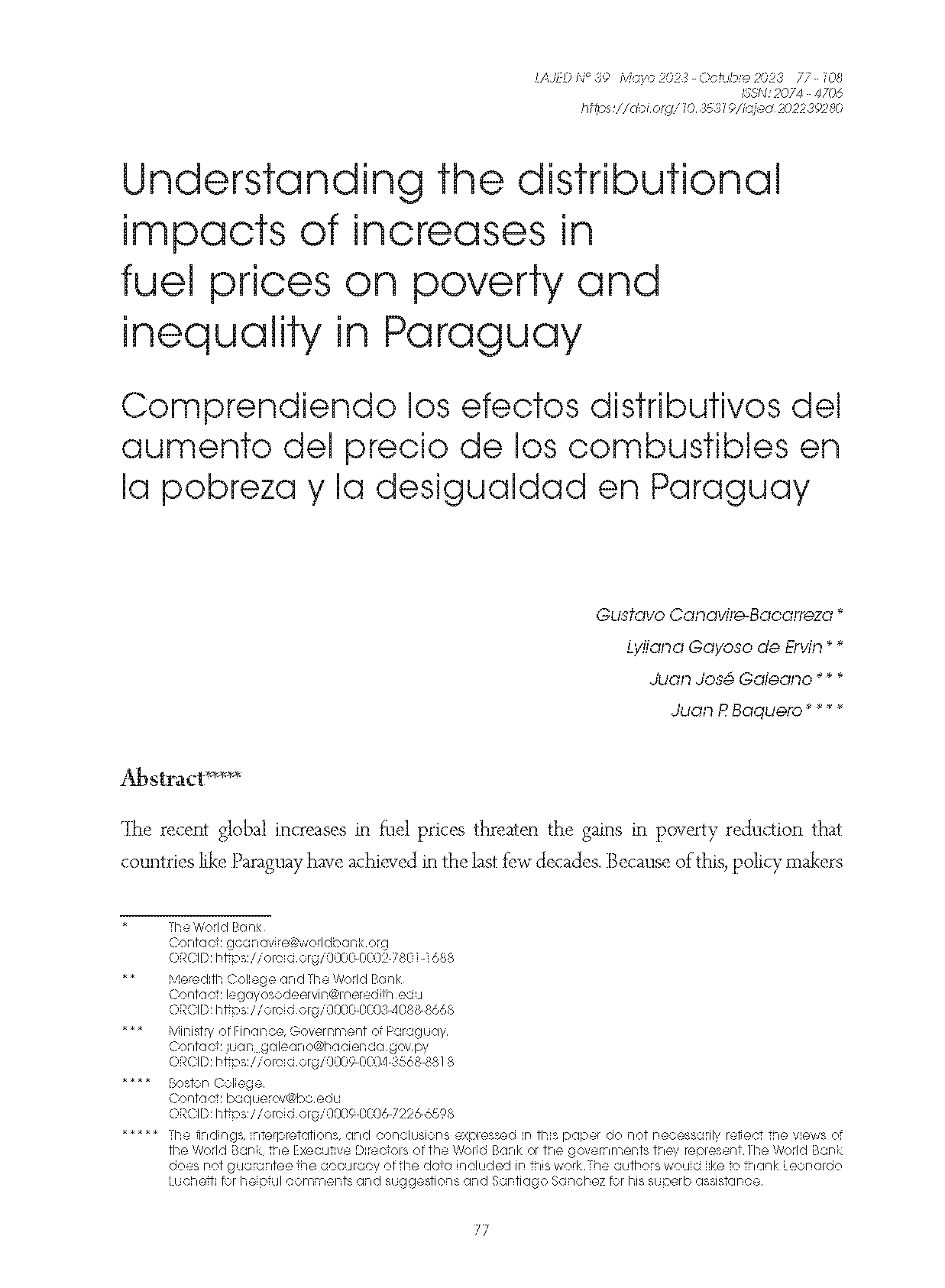Understanding the distributional impacts of increases in fuel prices on poverty and inequality in Paraguay
DOI:
https://doi.org/10.35319/lajed.202239280Keywords:
fuel prices, poverty, inequality, ParaguayAbstract
The recent global increases in fuel prices threaten the gains in poverty reduction that countries like Paraguay have achieved in the last few decades. Because of this, policy makers must understand the potential distributional impacts of increases in fuel prices to evaluate the implementation of alternative measures that could mitigate these impacts. In this paper, we analyze the potential effects of increases in fuel prices on poverty and inequality in Paraguay. Using microsimulation methods and based on the Commitment to Equity (CEQ) framework, we estimate the impact of higher fuel prices on welfare, poverty, and inequality based on three scenarios: (a) increases in gasoline prices, (b) increases in diesel prices, and (c) simultaneous increases in gasoline and diesel prices. The results obtained suggest that the total impact of increasing fuel prices tends to be more regressive in Paraguay. At the same time, the results of our simulations indicate small positive effects on income inequality.
Downloads
References
Arndt, C., Benfica, R., Maximiano, N., Nucifora, A. M., & Thurlow, J. T. (2008). Higher fuel and food prices: impacts and responses for Mozambique. Agricultural Economics, 39, 497-511.
Aziz, S., Yaseen, M. R., & Anwar, S. (2016). Impact of rising energy prices on consumer's welfare: a case study of Pakistan. The Pakistan Development Review, 605-618.
Chakravarty, S., & Mitra, A. (2010). Growth, Prices and Poverty. Journal of Modelling & Simulation of Systems, 1(4).
Choe, C., & Moosa, I. A. (1998). A Dynamic Forecasting Model of Oil Demand in Developing Countries. The Journal of Energy and Development, 23, 195-206.
Coady, M. D., Flamini, V., & Sears, L. (2015). The unequal benefits of fuel subsidies revisited: Evidence for developing countries. Washington D.C.: International Monetary Fund.
Ersado, L. (2012). Poverty and distributional impact of gas price hike in Armenia. World Bank Policy Research Working Paper No. 6150.
Feng, K., Hubacek, K., Liu, Y. M., & Vogt-Schilb, A. (2018). Managing the distributional effects of energy taxes and subsidy removal in Latin America and the Caribbean. Applied Energy, 225, 424-436.
Gillingham, M. R. (2008). Poverty and social impact analysis by the IMF: Review of methodology and selected evidence. Washington D.C.: International Monetary Fund.
Kakwani, N. C. (1977). Measurement of tax progressivity: An international comparison. The Economic Journal , 71-80.
Lustig, N. (2016). Inequality and Fiscal Redistribution in Middle Income Countries: Brazil, Chile, Colombia, Indonesia, Mexico, Peru and South Africa. Journal of Globalization and Development, 17-60.
Lustig, N., & Higgins, S. (2018). THE CEQ ASSESSMENT. Commitment to equity handbook: Estimating the impact of fiscal policy on inequality and poverty. Washington D.C.: Brookings Institution Press.
Medinaceli Monrroy, S. M. (2003). Subsidio al precio del Gas Licuado de Petróleo en Bolivia. Revista Latinoamericana de Desarrollo Económico, 1, 99-133.
Muthalib, A. A. (2018). The influence of fuel prices and unemployment rate towards the poverty level in Indonesia. International Journal of Energy Economics and Policy, 8(3), 37-42.
OECD. (2018). Multi-dimensional Review of Paraguay Volume 1. Initial Assessment. OCDE Development Pathways.
STP. (2014). Plan Nacional de Desarrollo 2030. Asuncion: Secretaria Tecnica de Planificacion.
Van Buuren, S. (2018). Flexible imputation of missing data (Second Edition). Boca Raton: CRC Press.
White, I. R., Royston, P., & Wood, A. M. (2011). Multiple imputation using chained equations: Issues and guidance for practice. Statistics in Medicine, 30(4), 377-399.

Downloads
Published
How to Cite
Issue
Section
License
Copyright (c) 2023 Revista Latinoamericana de Desarrollo Económico

This work is licensed under a Creative Commons Attribution-NonCommercial 4.0 International License.





